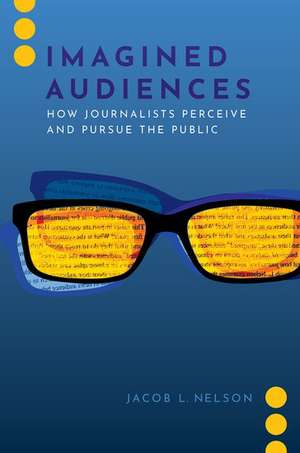Imagined Audiences: How Journalists Perceive and Pursue the Public: Journalism and Political Communication Unbound
Autor Jacob L. Nelsonen Limba Engleză Paperback – 21 apr 2021
| Toate formatele și edițiile | Preț | Express |
|---|---|---|
| Paperback (1) | 172.27 lei 10-16 zile | |
| Oxford University Press – 21 apr 2021 | 172.27 lei 10-16 zile | |
| Hardback (1) | 527.31 lei 31-37 zile | |
| Oxford University Press – 21 apr 2021 | 527.31 lei 31-37 zile |
Preț: 172.27 lei
Preț vechi: 199.67 lei
-14% Nou
Puncte Express: 258
Preț estimativ în valută:
32.97€ • 34.29$ • 27.22£
32.97€ • 34.29$ • 27.22£
Carte disponibilă
Livrare economică 14-20 martie
Preluare comenzi: 021 569.72.76
Specificații
ISBN-13: 9780197542606
ISBN-10: 0197542603
Pagini: 232
Dimensiuni: 234 x 155 x 18 mm
Greutate: 0.34 kg
Editura: Oxford University Press
Colecția OUP USA
Seria Journalism and Political Communication Unbound
Locul publicării:New York, United States
ISBN-10: 0197542603
Pagini: 232
Dimensiuni: 234 x 155 x 18 mm
Greutate: 0.34 kg
Editura: Oxford University Press
Colecția OUP USA
Seria Journalism and Political Communication Unbound
Locul publicării:New York, United States
Recenzii
The book is important both because it shows the many different ways of dealing with the audiences and because it contains a very important side story...this book is to be recommended to both journalists and researchers who are interested in the fundamental questions of the relations between journalism and its audiences.
This is a well-researched, thoughtful addition to the literature about journalism's decline. Highly recommended.
Sharply written and closely observed, Imagined Audiences argues that journalists' beliefs about the audiences they attempt to serve often fall short. Nelson shows that in an era of 24/7 online audience data, what journalists actually understand about their audiences is surprisingly limited and uncertain. Grounded in ethnographic study of three news organizations, Imagined Audiences provides an important and timely framework for thinking about the industry-wide embrace of—and ambivalence about—audience engagement, particularly with respect to audiences traditionally overlooked by mainstream news. Ultimately, Nelson argues, while this focus on connecting with audiences may or may not succeed in improving journalism's bottom line, it may nevertheless improve journalism.
There are lots of assumptions about how journalists are engaging their audiences in the digital age—but many of them haven't been put to the test like they are in this book. Jacob L. Nelson presents a must-read account of how journalists may variously see their audiences as a source of frustration or a source of inspiration, and why those imaginations and the complications and contradictions surrounding them are at the heart of the most consequential debate about the future of news happening today.
As journalism faces a profound structural crisis, Nelson's timely and nuanced ethnographic analysis provides an invaluable roadmap for understanding the ever-shifting relationships between different kinds of audiences and different types of journalists. The book is both deeply researched and a joy to read. It's perfect for students, scholars, journalists, and citizens concerned about the future of their news media and their democracy.
In this illuminating work, Jacob L. Nelson complicates the notion that 'engagement' with audiences alone will save the press. Imagined Audiences asks newsrooms to get real about trust-building obstacles, accept that news audiences are ultimately unknowable, and combine approaches—including engagement—toward relevancy. Read it all the way to the end: You will not be disappointed and might even come away with an idea for how to fix news media.
This is a well-researched, thoughtful addition to the literature about journalism's decline. Highly recommended.
Sharply written and closely observed, Imagined Audiences argues that journalists' beliefs about the audiences they attempt to serve often fall short. Nelson shows that in an era of 24/7 online audience data, what journalists actually understand about their audiences is surprisingly limited and uncertain. Grounded in ethnographic study of three news organizations, Imagined Audiences provides an important and timely framework for thinking about the industry-wide embrace of—and ambivalence about—audience engagement, particularly with respect to audiences traditionally overlooked by mainstream news. Ultimately, Nelson argues, while this focus on connecting with audiences may or may not succeed in improving journalism's bottom line, it may nevertheless improve journalism.
There are lots of assumptions about how journalists are engaging their audiences in the digital age—but many of them haven't been put to the test like they are in this book. Jacob L. Nelson presents a must-read account of how journalists may variously see their audiences as a source of frustration or a source of inspiration, and why those imaginations and the complications and contradictions surrounding them are at the heart of the most consequential debate about the future of news happening today.
As journalism faces a profound structural crisis, Nelson's timely and nuanced ethnographic analysis provides an invaluable roadmap for understanding the ever-shifting relationships between different kinds of audiences and different types of journalists. The book is both deeply researched and a joy to read. It's perfect for students, scholars, journalists, and citizens concerned about the future of their news media and their democracy.
In this illuminating work, Jacob L. Nelson complicates the notion that 'engagement' with audiences alone will save the press. Imagined Audiences asks newsrooms to get real about trust-building obstacles, accept that news audiences are ultimately unknowable, and combine approaches—including engagement—toward relevancy. Read it all the way to the end: You will not be disappointed and might even come away with an idea for how to fix news media.
Notă biografică
Jacob L. Nelson is an Assistant Professor at the Walter Cronkite School of Journalism and Mass Communication at Arizona State University, and a fellow with the Tow Center for Digital Journalism at Columbia University. He researches the relationship between journalism and the public.











